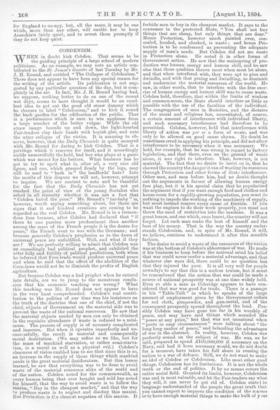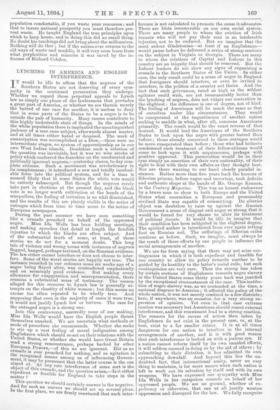COBDENISM.
WHEN in doubt kick Cobden. That seems to be the guiding principle of a large school of modern politicians. As an example, we may note an article con- tributed to the St. James's Gazette of last Tuesday by Mr. J. H. Round, and entitled "The Collapse of Cobdenism." There does not appear to have been any special reason for the writing of the article. Its publication is not sug- gested by any particular question of the day, but is com- pletely in the air. In fact, Mr. J. H. Round having had, we suppose, nothing better to do on one of the recent wet days, seems to have thought it would be an excel- lent idea to get out the good old straw dummy which he chooses to label " Cobdenism," and to kick it round the back garden for the edification of the public. That is a performance which is sure to win applause from a large number of the better vulgar. While the old straw image bounds up and down, the light-hearted Fair-traders clap their hands with boyish glee, and note the utter collapse of the victim. It is amusing to ob- serve, however, that the Daily Chronicle is quite annoyed with Mr. Round for daring to kick Cobden. That is a privilege which it reserves for itself, and it accordingly scolds unmercifully the bold, bad boy who plays at a game which was meant for his betters. What business has he got to try to spoil what is, after all, a very nice old figure, and one, which grasped firmly by the legs, may still be used to "bash in" the landlords' hats I' Into the merits of this dispute we will not, however, attempt to inquire. We are content to note and be thankful for the fact that the Daily Chronicle has not yet reached the point of view of the young Socialist who asked in all sincerity whether it was not a fact that "Cobden hated the poor." Mr. Round's " tar-baby " is, however, worth saying something about, for there are signs that it and kindred creations are coming to be regarded as the real Cobden. Mr. Round is in a tremen- dous fuss because, after Cobden had declared that "if there be one passion more predominant than another among the mass of the French people it is the desire for peace," the French went to war with the Germans ; and because generally Cobden's prophecies as to the dawn of universal peace are unfulfilled. Well, and what if they are ? We are perfectly willing to admit that Cobden was an exceedingly bad political prophet, and exhibited the utter folly and futility of political predictions, both when he inferred that Free-trade would produce universal peace and when he said that the effect of the abolition of the -Corn-laws would not be to diminish the profits of English .agriculture. But because Cobden was a bad prophet when he entered into details, are we to jump to the monstrous conclu- sion that his economic teaching was wrong? What this teaching was Mr. Round does not appear to have in the very least comprehended. Cobden's real contri- bution to the politics of our time was his insistence on the truth of the doctrine that one of the chief, if not the -chief, objects of Government on the material side was to prevent the waste of the national resources. He saw that the material objects needed by men can only be obtained in the requisite abundance if waste is reduced to a. mini- mum. The process of supply is of necessity complicated and insecure. But when it operates imperfectly and Un- successfully, the result is material and consequently sinoral destitution. (We may refine as we like, but for the mass of mankind starvation, or rather semi-starva- tion, is a moral as well as a physical evil.) Cobden's clearness of vision enabled him to see that since this is so, an increase in the supply of those things which mankind needs is the great material desideratum. But this lesson learned, he saw that everything was to be done to avoid waste of the material resources alike of the world and of the nation. Cobden noted for the commonwealth, as every human being that ever bought and sold has noted for himself, that the way to avoid waste is to follow the maxim, "Buy in the cheapest market," and that the way 1.0 produce waste is to neglect and disobey this maxim. But Protection is tle clearest negation of this maxim. It forbids men to buy in the cheapest market. It says to the consumer in the protected State, "You shall not buy things that are cheap, but only things that are dear." Hence Protection, however much painted over, con- cealed, hooded, and cloaked, is waste ; and hence Pro- tection is to be condemned as preventing the adequate supply of man's needs, But Cobden did not see waste in Protection alone. He noted it in other forms of Government action. He saw that the mainspring of pro- duction was human energy and human skill, and he saw also that these qualities throve most when most let alone, and that when interfered with, they were apt to pine and dwindle, and with that pining and dwindling, to diminish and undermine the material resources of the world. He saw, in other words, that to interfere with the free exer- cise of human energy and human skill was to cause waste. Cobden held, therefore, that within the limits of wisdom and common-sense, the State should interfere as little as possible with the use of the faculties of the individual. The congregation of men in Societies, and the dictates of the moral and religious law, necessitated, of course, a certain amount of interference with individual liberty, and such necessary interference had therefore to be permitted. Cobden, however, held that interference with liberty of action was per se a form of waste, and was only to be allowed on good cause shown. No doubt he sometimes erred in applying his principle, and did not allow interference to be necessary when it was necessary. We hold, for example, that he was wrong in regard to factory legislation, and that there, even on the ground of waste alone, it was right to interfere. That, however, is not material. The fact that we desire to insist on is, that he showed the country the danger it ran of wasting its resources through Protection and other forms of State interference. Other men, and men before him, had no doubt thought out the arguments in favour of allowing human energy free play, but it is his special claim that he popularised the argument that if you want enough food and clothes and house-room for a rapidly-growing population, you must do nothing to impede the working of the machinery of supply, but must instead remove every cause of friction. If you want the engines to do their work properly, you must not throw the sand of restriction into the machine. It was a great lesson, and one which, once learnt, the country will not forget. Let each man make the best of himself and the best of his money. That is the way the country under- stands Cobdenisna, and, in spite of Mr. Round, it will, we believe, continue to understand it after this sensible fashion.
The desire to avoid a waste of the resources of the nation was at the bottom of Cobden's abhorrence of war. He made it his business to keep before the national mind his belief that war could never confer a material advantage, and that whatever else wars did, there could be no question but that they injured the poor. It is all very well for people nowadays to say that this is a useless truism, but it must be remembered that the notion that war could be made a source of national prosperity was at one time widely held. Even so able a man as Coleridge appears to have con- sidered that war was good for trade. There is a passage in his " Table-Talk ' in which he speaks of the large amount of employment given by the Government orders for red cloth, gunpowder, and gun-metal, and of the consequ,ent prosperity spread throughout the land. Pos- sibly Cobden may have gone too far in his worship of peace, and may have said things which sounded like "peace at any price," but that was not unnatural when "poets in easy circumstances" were talking about "the long long canker of peace," and belauding the advantages of war in. the abstract. In reality, however, Cobden was perfectly sound on the subject of war. He was as he said, prepared to spend £100,000,000 if necessary on the Navy, and had it been necessary would, we do not doubt for a moment, have taken his full share in reusing the nation to a war of defence. Still, we do not want to make an idol of Cobden or Cobdenism. Like most other good things, Cobclenism has its limitations. It is not the whole truth or the end of politics. It by no means covers the entire social field. Granted its limits, however, Cobdenism was and is most valuable, and let the Fair-traders say what they will, it can never be got rid of. Cobden state I in language underatanded of the people the great truth that you cannot expect to improve the condition of the niaases or to have enough material things to make the bulk of ysur population comfortable, if you waste your resources ; and that to insure national prosperity you must therefore pre- vent waste. He taught England the true principles upon which to keep house, and in doing this did no small thing. No doubt his teachings did not bring about the millennium. Nothing will do that ; but if the nation ever returns to the old ways of waste and muddle, it will very soon learn from what perplexities and miseries it was saved by the in- fluence of Richard Cobden,



































 Previous page
Previous page